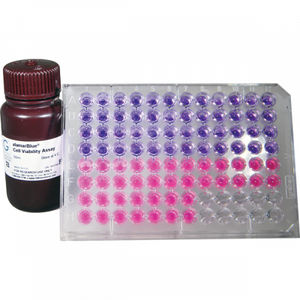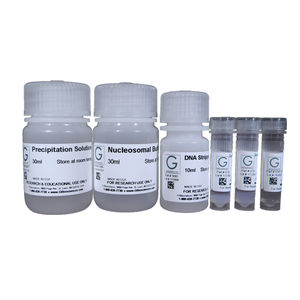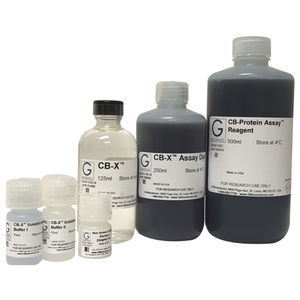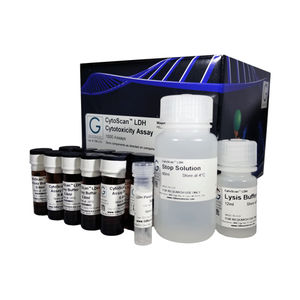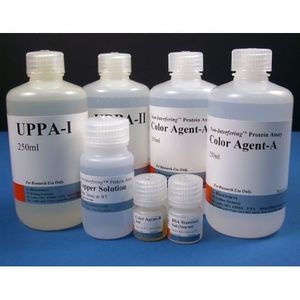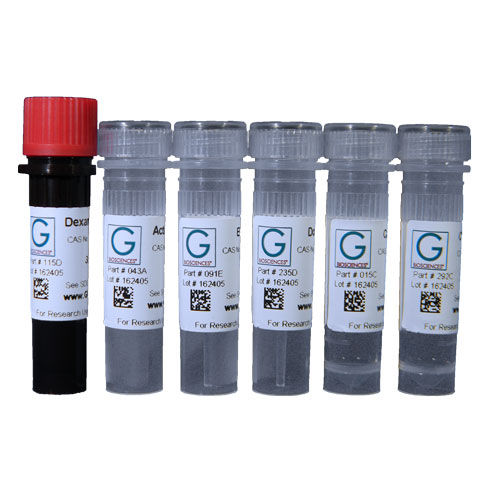
- Laboratory
- Laboratory medicine
- Enzyme reagent
- G-BIOSCIENCES
Solution reagent kit API-16Senzymeapoptosisprotein
Add to favorites
Compare this product
Characteristics
- Type
- solution, enzyme
- Applications
- apoptosis
- Tested parameter
- protein, for dexamethasone
- Micro-organism
- bacteria
Description
Ready-to-use high quality apoptosis inducers allow users an easy tool for induction of apoptosis in cultured cells. These stabilized reagent solutions have a long storage life and are easy to use. The selection of apoptosis inducers include actinomycin D, camptothecin, cycloheximide, dexamethasone, doxorubicin and etoposide. All six are supplied individually as well as a set of 6 in the Apoptosis Inducer Set.
Actinomycin D
A class of polypeptide antibiotics isolated from the Steptomyces soil bacteria. Actinomycin D inhibits transcription by binding to DNA at the transcription initiation complex and therefore preventing elongation by the RNA polymerase.
Supplied as 50μl 10mM solution.
Camptothecin
(4-ethyl-4-hydroxy-1H-pyrano[3’,4’:6,7]indolizino[1,2-b] quinoline-3,14-(4H,12H)-dione)
A cytotoxic quinoline alkaloid that inhibits the DNA enzyme topoisomerase I (Topo I).
Supplied as 1ml 2mM solution.
Cycloheximide
(4-{(2R)-2-[(1S,3S,5S)-3,5-dimethyl-2-oxocyclohexyl]-2-hydroxyethyl}piperidine-2,6-dione)
An inhibitor of protein synthesis by interfering with the translocation step (movement of two tRNA molecules and mRNA on ribosome) in protein synthesis, thus blocking translational elongation.
Supplied as 1ml 100mM solution.
Dexamethasone
(9-fluoro-11β,17,21-trihydroxy-16a-methylpregna-1,4-diene-3,20-dione)
A potent and stable glucocorticoid steroid hormone that is often used as an anti-inflammatory and anti-rheumatic drug.
The mechanism of action is not fully understood, however it is thought that it may inhibit prostaglandin synthesis.
Supplied as 1ml 10mM solution.
Catalogs
No catalogs are available for this product.
See all of G-BIOSCIENCES‘s catalogsRelated Searches
- Assay kit
- Solution reagent kit
- Molecular biology reagent kit
- Research reagent kit
- Protein reagent kit
- Laboratory reagent kit
- Enzyme reagent kit
- Histology reagent kit
- Optical assay kit
- Reagent medium reagent kit
- Immunology reagent
- Cytology reagent kit
- Dye reagent
- Antibody
- Buffer solution reagent kit
- Clinical chemistry reagent
- Bacteria reagent kit
- Research assay kit
- Virus reagent kit
- Laboratory detection kit
*Prices are pre-tax. They exclude delivery charges and customs duties and do not include additional charges for installation or activation options. Prices are indicative only and may vary by country, with changes to the cost of raw materials and exchange rates.


